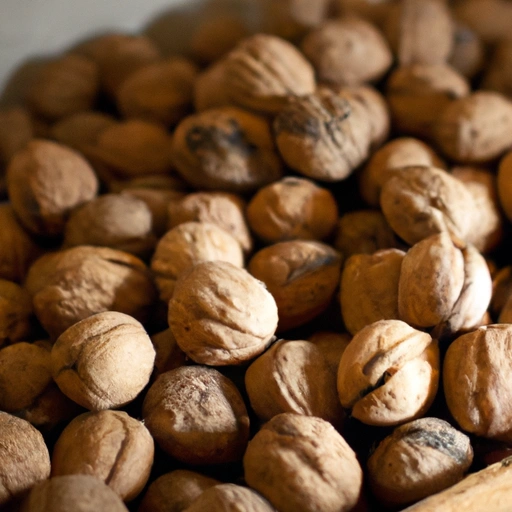Nut
Description

Nuts are a highly versatile and nutritious ingredient popular in both sweet and savory recipes around the world. They are the edible seeds of various trees and plants, and are encased in a hard outer shell which is typically removed before consumption. Nuts are celebrated for their distinctive flavors and textures, which range from creamy and buttery to crunchy and nutty. In cooking and baking, they can be used whole, chopped, ground, or as a paste, offering an array of applications across different cuisine styles.
Common uses
Nuts are commonly used as a snack, either raw or roasted, and are often seasoned or candied. They are frequently found in baked goods such as cakes, cookies, and pastries, as well as in confectionery items like chocolates and pralines. Nuts are also used to add texture and flavor to salads, cereals, and yogurt. In savory dishes, they can be incorporated into coatings for proteins, sprinkled over stir-fries, or blended into sauces and dips.
Nutritional value
Calories
Nuts are energy-dense foods, with calorie counts varying by type. For example, 1 ounce (28 grams/approx. 2 tablespoons) of almonds contains about 164 calories (685 kJ), while the same amount of walnuts provides around 185 calories (773 kJ).
Protein
Protein content in nuts is substantial, making them a great plant-based protein source. An ounce of almonds offers about 6 grams of protein, and an ounce of walnuts provides approximately 4 grams of protein.
Fat
Though high in fats, nuts contain beneficial monounsaturated and polyunsaturated fats. An ounce of almonds contains about 14 grams of fat, primarily healthy fats, with a small amount of saturated fat.
Carbohydrates
Nuts generally have lower carbohydrate contents. For example, an ounce of almonds has roughly 6 grams of carbohydrates, of which 3.5 grams are dietary fiber.
Vitamins
Nuts are a good source of various vitamins, particularly vitamin E. One ounce of almonds contains about 7.3 mg of vitamin E, which is nearly half the recommended daily intake.
Minerals
Nuts also contain important minerals such as magnesium, phosphorus, and copper. An ounce of cashews, for instance, has about 83 mg of magnesium, which is about 20% of the recommended daily intake.
Health benefits
Nuts contribute to heart health due to their high levels of unsaturated fats, omega-3 fatty acids, fiber, and vitamin E. Regular consumption of nuts is associated with a reduced risk of cardiovascular diseases. Nuts also contain antioxidants, which can help combat oxidative stress and may reduce the risk of certain cancers. The fiber content in nuts aids in digestion and helps maintain a healthy weight by promoting satiety.
Potential risks
While nuts are nutritious, they are also high in calories and can contribute to weight gain if consumed in excess. Additionally, some individuals may have allergic reactions to certain nuts, which can range from mild to potentially life-threatening (anaphylaxis). Nuts can also be high in sodium if salted, which should be considered by individuals monitoring their sodium intake.
Common recipes
Nuts are featured in a myriad of recipes such as pesto, granola bars, nut butters, energy bites, and a variety of desserts like pecan pie, almond biscotti, and walnut brownies.
Cooking methods
Nuts can be eaten raw, toasted, roasted, or blanched. Toasting nuts in a dry skillet or oven can enhance their flavor and crunchiness. They can also be soaked or sprouted to improve digestibility.
Pairing with other ingredients
Nuts pair well with fruits, chocolate, cheese, honey, and spices like cinnamon and nutmeg. They also complement grains and legumes and can be used to enrich the taste and texture of vegetarian and vegan dishes.
Summary
Nuts are a nutrient-rich ingredient with a rich history and a broad range of culinary applications. They enhance the flavor, texture, and nutritional profile of dishes and offer health benefits when consumed in moderation. However, those with allergies or watching their calorie intake should consider their nut consumption carefully.